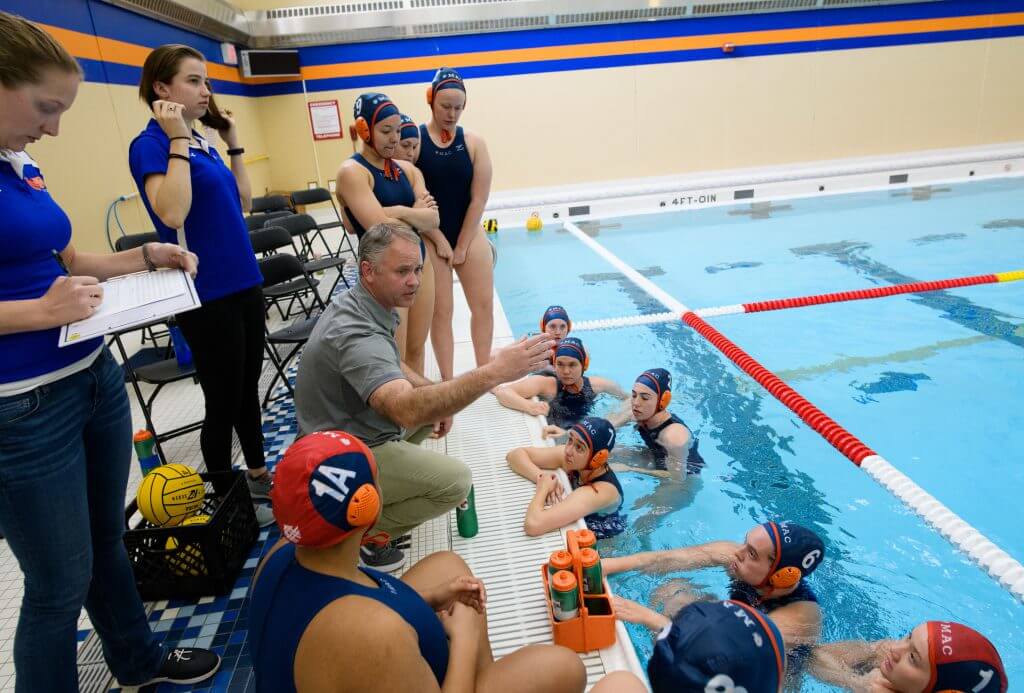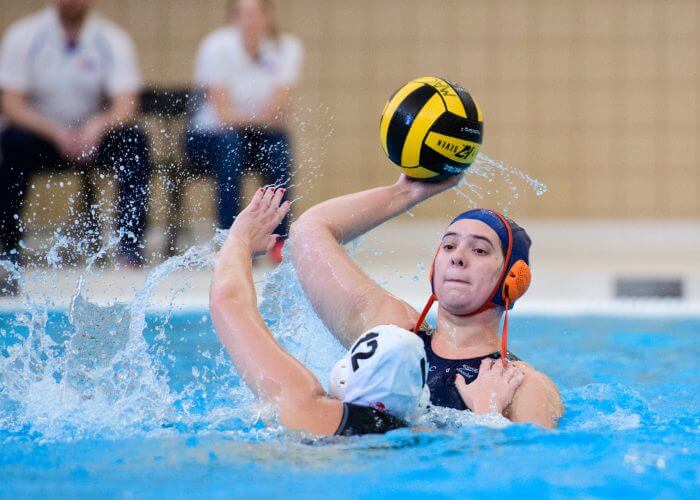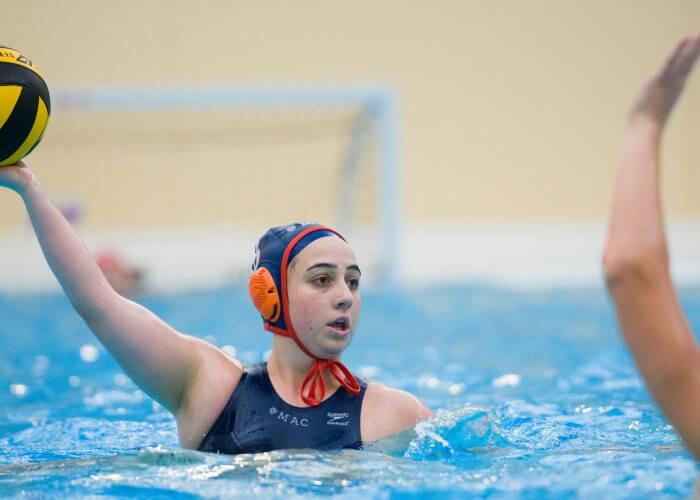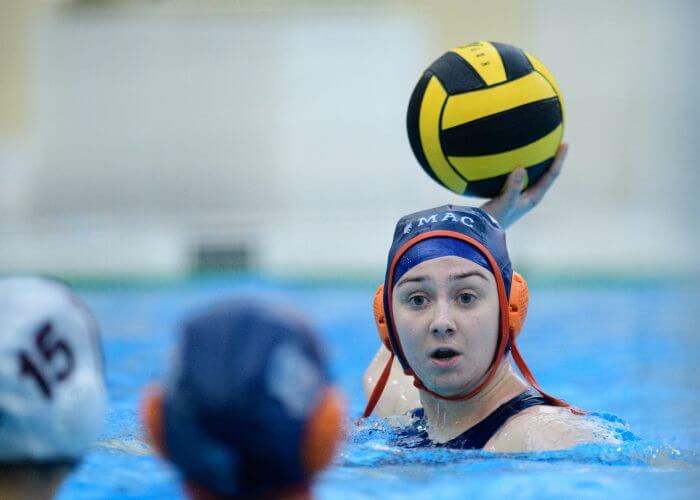On The Record with Scott Reed, Macalester Women’s Water Polo Coach

Editorial content for the 2019 NCAA DI Men's Swimming & Diving Championships coverage is sponsored by S&R Sport.
See full event coverage.
Follow S&R Sport on Instagram at @srsportaquatics

Minnesota is not the first place that comes to mind when considering outstanding women’s water polo programs. But one of country’s best Division III programs is located at Macalester College, a small, liberal arts institution in St. Paul. The Scots have recently dominated competition in the ten-school Collegiate Water Polo Association’s DIII bracket, winning the past three championships and being favored for a fourth this season.
[2020 Swimming World Women’s Water Polo Previews: CWPA Varsity Division III]
 The Scots’ success follows a tried and true formula for DIII polo; smart, dedicated athletes, a supportive administration, excellent facilities and a knowledgeable and inspiring coach who brings out his program’s strengths. On that last point, Macalester has landed one of NCAA varsity polo’s best practitioners. Scott Reed arrived five years ago and in short order put his program on a path to sustainable success.
The Scots’ success follows a tried and true formula for DIII polo; smart, dedicated athletes, a supportive administration, excellent facilities and a knowledgeable and inspiring coach who brings out his program’s strengths. On that last point, Macalester has landed one of NCAA varsity polo’s best practitioners. Scott Reed arrived five years ago and in short order put his program on a path to sustainable success.
Not daunted by the school’s location—Minnesotans are the regular butt of jokes about their state’s epic snow falls—Reed brings a history of success in a number of different programs, including as a player and coach with the University of Massachusetts, whose teams qualified for a remarkable seven NCAA championships in nine years (1993 – 2001) before being eliminated as an NCAA varsity sport in 2002.
After serving as UMass Head Coach Russ Yarworth’s top assistant at the beginning of the Minuteman’s string of success, Reed moved on to Washington & Lee before landing a job at George Washington in 1999. During his 16 years in Washington, D.C., Reed inaugurated women’s water polo, leading both the Colonials men’s and women’s teams. In 2016 he took the reins of a Macalester program that had gone 11-14 the previous year then slumped to 4-20 in his first season. The next season the Scots enjoyed a memorable turnaround, winning 13 more matches than the year before as they swept to the 2017 CWPA DIII Championship title, beating Washington & Jefferson in overtime on a goal by Lucille Moran.
His team’s success resulted in Reed being named the 2017 CWPA Coach of the Year, an honor bestowed upon him again in 2018.
Swimming World spoke with the Scots’ coach prior to his team’s opening season of play this weekend at Macalester’s Riley Pool—where the Scots open the defense of their 2019 title with a match against Carthage College—about his team’s success, the graduation of Moran, a key member of Macalester’s championship run, and the prospect of competing for the first-ever Division III National Collegiate Women’s Water Polo Championship this spring.
– You’re entering a fifth season at Macalester; in three of those years you’ve won titles and the Scots are favored in 2020 for a fourth-straight CWPA championship. How do you explain this success?
It’s a great group of student athletes that we have here at Macalester. They just know how to balance everything: their academic lives, their internship lives, their research lives.

Lucille Morgan. Photo Courtesy: Christopher Mitchell
Because they’re able to do that so well, they’re able to give their full attention to me once they’re in the pool, and once we’re on our traveling trips. It makes things so easy. It’s a very supportive group of individuals who understand that everybody is part of the equation for success. It’s made my job really easy.
– The fact is, smart student athletes have bought into a successful system—and you’re the one who’s orchestrating that success.
When I first got here, it was a group in complete disarray that didn’t know how to be pushed, didn’t really know what hard work was, and didn’t, didn’t really quite understand that you can work hard, and still have fun doing what you’re doing.
The first year I was here was quite challenging, but I was able to put this information in their heads, and begin the process. Did I expect them to have so much success right away? Heck no! It was one of those things where we had players in place that worked well with others, and helped lead the development of those that did not have the same experiences.
– What is it about the school’s environment—and a commitment to water polo—that caused you to pick Macalester?
Our facilities are among of the best you can find at the Division III level. This school provides lots of support towards athletics and all the other things. When they build things, they build [them] the right way.
That was basically the biggest selling point for me to come here. When I looked at the facilities, I [thought]: “There’s so much potential in what you can do with a pool like this.” That’s what attracts a lot of the kids that we have here today; the facilities that we have, the campus that we have, the setting of the campus, and how close it is to two major cities.
– You only let them visit in the summer, right?
Well, we do have junior prospect days, and things like that in April. Last April we had a snow storm right before it. It’s hard to pick a very specific time of the year. We’re also not afraid of bringing these individuals in during the cold weather, because they have to live in this, they have to experience it and they have to realize this is part of what Macalester is.
You’ve got to get a taste of [that].

Cara Mullery. Photo Courtesy: Christopher Mitchell
– It’s a constant in DIII water polo that a strong academic program correlates with success in an extremely challenging sport.
They have opportunities to succeed. They have opportunities there not only in the pool, but also in the classroom as well. I think that’s why we get the kids that we get—it’s because they want those opportunities. They don’t want to be put in a corner somewhere, where they kind of get lost in the crowd.
They come here because they know they’re going to have my attention. They’re going to have their teammates attention, and have that opportunity to be part of what we are.
– I see that your roots are with the great UMass programs of the 1990s; how does that situation compare with what you’ve established in St. Paul?
One of the things I learned when I was at UMass was I had a very confident coach. I think that confidence spread to all of us. When we played, we never played with panic. We always looked at our coach, Russ Yarworth, and we saw a lot of confidence in him.
That’s what I try and do here; I don’t panic. I don’t like to scream and yell. I like them to feed off of my confidence. That’s what they’ve been able to do. It’s one of the biggest things that I learned as a player; [they] pick up on the way the way coaches are coaching. If a coach is in a panic mode, they tend to panic themselves. That’s something I try not to do. I try to be a good example on deck as I’m coaching.
– Lucille Moran (four-time All-CWPA first team and two-time CWPA DIII Player of the Year)—has graduated. You have to replace a player who has been a foundation for your program. Is this a collective situation or will a specific individual take on Morgan’s role?
It’s definitely collective. You just can’t replace a player like Lucy. She’s a once in a generation type of player for us.

Oriana Galasso. Photo Courtesy: Christopher Mitchell
We’re depending on a lot of different players to pick up a little of everything that she did for us. We have Oriana Galasso and Cara Mullery, who are two very big offensive players. Then, Riley Waters, who was a first-year last year, is a sophomore this year at the center position. She was able to learn from Lucy quite a bit last year. Now she’s ready to step in and fill out that center position role.
We have a first year, Eleanor Michaud, who is very similar to Lucy in the sense that she can do a lot of different things. She’s going to be able to step up as a [freshman] and fill in some of those roles as well.
– The new national championship offers a world of possibility to DIII programs. How much would it mean to your program to qualify—and what will it take for the Scots to get to there?
For us to get back—and have an opportunity to do that—we have to reinvent ourselves. We have to change our style of play. In the past three years we knew that Lucy was somebody that could anchor our defense at the center defense position, and then shut down any centers that we may encounter. We don’t have that this year. Plus, the goalkeeper position is definitely going to be a challenge as well.
We’re tinkering with some new ideas on offense and new ideas on defense. If we can make it all work, and make it all come together, I think we’re going to be in a good position. I know my athletic director is very excited about the prospects of a national championship, and the team has really started to embrace it as well.
They just didn’t quite understand what it was all about, but now they really have a great idea of it, and they’re excited to get themselves there.




.png)

Great article! Good Luck to the Scots, and Scott!